
Like any self-care treatment, the best hair removal for you is completely based on your personal preferences and circumstances. When deciding how to manage your unwanted hair, consider the area of your face or body being treated and how much hair you want to remove. Different hair removal treatments will work better for certain areas, depending on whether you’re seeking to groom the hair or want to leave the skin completely bare. Several factors come into play when choosing the best hair removal method for you, including the efficacy, convenience, cost, required maintenance and the pain associated with each treatment option.
Different types of hair removal methods come with their own set of pros and cons. Generally speaking: If the relative cost and pain level of a hair removal session is high, the lower the frequency of treatments needed to maintain your desired results. Additionally, hair removal methods that promise long-lasting or (semi) permanent results often require significantly more preparation and after-care than pain-free options that require regular upkeep (e.g. shaving and plucking or tweezing).
Expert Tip: Zensa Numbing Cream contains 5% lidocaine to optimize your hair removal experience before getting a wax, epilating, or any laser hair removal or electrolysis session to provide you with a nearly pain-free experience. Optimize your skin health and after-care routine with Zensa Healing Cream, which contains medicinal-grade calendula oil and grapefruit essential oil to reduce inflammation, soothe irritation and increase cellular turnover. These benefits of Zensa Healing Cream help calm your skin – especially when it is particularly sensitive, like after waxing, shaving, sugaring or using another hair removal treatment – while strengthening the skin barrier to prevent ingrown hairs.
Read on to learn more about: Different types of hair removal methods; Where they fall on our least to most painful hair removal methods ranking, and; Ways to care for your skin before & after your treatment for an overall less painful hair removal experience.
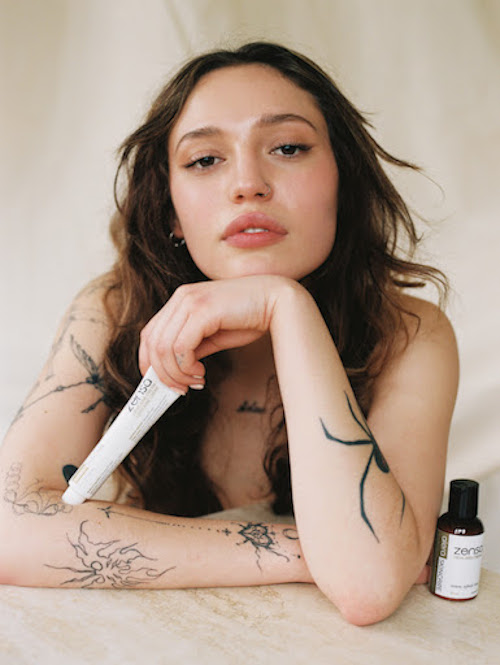
Least Painful Hair Removal Methods:
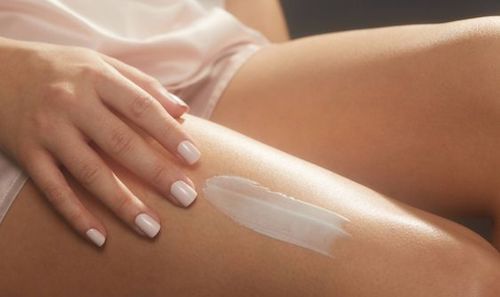
Credit: Skincare.com
Depilatory Creams
These hair removal creams are affordable, convenient, easy-to-use and are the most painless hair removal method available (probably at your local drugstore). Depilatory creams contain an active ingredient called thioglycolic acid, which breaks down keratin (the proteins that bind your hair strands together). Like shaving, depilatory creams remove hair from the shaft (hairs that visibly stick out from the surface of the skin). The results from depilatory creams last for around 3 days before you need another application to maintain hair-free skin. However, while there’s no risk of razor burn, depilatory creams can cause chemical burns if they irritate your skin, or are misused or applied too frequently (more than once every 72 hours). This potential side effect of depilatory creams must be treated immediately. Wash off the hair removal cream if you notice burning or see any signs of skin irritation.
Make sure that you’re using the proper type of depilatory cream for the specific area being treated. Some hair removal creams are designed for sensitive areas, like the face and private parts or are formulated to strictly use on less vulnerable body parts, particularly the legs. Always do a patch test before applying a depilatory cream to a larger section of the skin.

Shaving
This hair removal method should be pain-free when done with a sharp razor on wet, well-lubricated skin. Shaving offers a few advantages compared to other hair removal methods: It’s painless, simple, quick, affordable and can be done in a pinch. However, the results from shaving will only last for around 2-3 days because shaving only removes the hairs sticking out from the top layer of your skin. Shaving must be done regularly to keep your skin hair-free, which leaves you continuously susceptible to razor burn, skin irritation, redness and in-grown hairs. The best way to prevent these mild but uncomfortable side effects is to exfoliate before and moisturize the skin immediately after shaving. Use a product like Zensa Healing Cream to reduce inflammation, soothe any burning, redness or irritation and hydrate the skin to keep the surface area smooth and free of painful ingrown hairs.
Moderately Painful Hair Removal Methods:
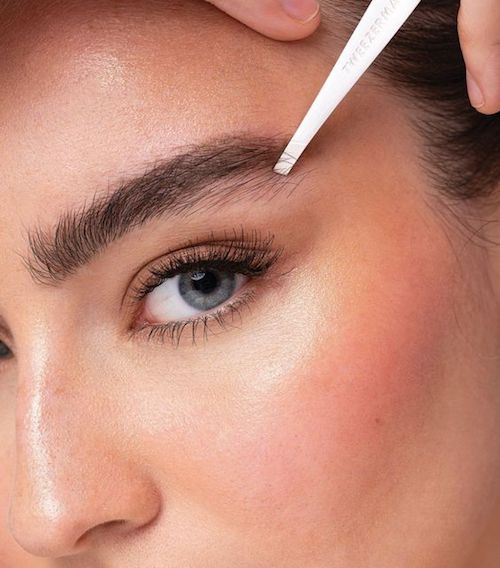
CreditHarrods/Pinterest
Plucking or Tweezing
Plucking or tweezing can be done on its own for smaller patches of hair (namely the brows, upper lip or other areas on the face) or used in conjunction with other hair removal methods to complete detail work after eyebrow threading, sugaring or waxing. Tweezing is a great at-home method to use for removing stray hairs or maintaining results in-between sugaring, waxing, threading or other hair removal sessions. How painful a plucking hair removal session depends on a few factors. The first time you pluck unwanted hair from a certain area will likely be the most painful. The more sensitive the area, the more painful this initial tweezing session will be (think: upper lip, the bottom of the nose or around the nipple). Some ways to make plucking less painful include:
-
Always tweeze hair right after a shower (hot water opens up the hair follicle)
-
Use sharp tweezers (purchase a new pair if your old ones become dull)
-
Pluck individual hairs from the root, in the direction of their natural hair growth
-
Apply pure aloe vera gel (or Zensa Healing Cream, which combines aloe vera with other soothing ingredients like calendula oil and cucumber extract)
While tweezing is simple, quick and can be relatively painless, stay mindful and do not overdo it. If you’re unsure about whether certain hairs should be plucked, leave it and assess the risk with a professional before removing it. Plucking hair growth in sensitive areas can be very painful and can result in unforeseen swelling, irritation and in-grown hairs. Most results from tweezing last for around 2 weeks.

Sugaring
Sugaring is a natural hair removal method that has risen in popularity over the past few years as a gentler and less painful alternative to traditional waxing. This hair removal method uses a sticky paste made from sugar, water and lemon juice to pull out unwanted hair from the root in the direction of the hair growth. Every sugaring session helps further weaken the hair follicles. After several treatments, this process significantly slows down or can stop hair growth altogether. Unlike traditional waxing, sugaring wax paste only sticks to unwanted hair (not the top layer of your skin), which makes sugaring a less abrasive, more suitable hair removal method for individuals with sensitive skin.
To minimize pain from sugaring hair removal treatments, put the razor down for 2 weeks beforehand and do not schedule an appointment 5 days before or during your period. Shaving can cause lingering irritation or razor bumps that can make sugaring more painful than necessary. Your skin is naturally more sensitive during that time of the month, so you will have a less painful experience if you plan your sugaring appointment around your cycle. On the day of your sugaring session, some experts may recommend taking an OTC painkiller right before heading to your appointment. We recommend using Zensa Numbing Cream as a more effective pain prevention option instead. Zensa Numbing Cream contains 5% lidocaine for maximum-strength pain prevention during your sugar hair removal treatment. Our vegan, cruelty-free formula also contains anti-inflammatory vitamin E to help soothe the skin before the treatment even begins.
If you’re interested in booking a sugaring hair removal treatment, here’s everything to know before your first appointment.

Waxing
Waxing is a popular hair removal method that offers effective, long-term results and is suitable for nearly all hair textures. Either hard wax or soft wax will be used, depending on the area of the body from where you want to remove unwanted hair. Hard wax is used on more sensitive areas, like the face or bikini area. Soft wax is used to remove hair from larger areas, like the arms or legs.
Results from waxing last for between 3-6 weeks, depending on your individual hair growth rate and how long you’ve been getting a particular area waxed. Like sugaring, waxing removes hair from the root, damages the hair follicle to slow hair growth over time and leaves you a finer, thinner hair texture in the designated area. Follow our guide on how to best care for your skin before and after waxing.
Waxing removes the unwanted hair while stripping the top layer of skin, which makes it a more painful hair removal method compared to milder hair removal methods like sugaring, shaving and depilatory creams. It generally hurts less to get a treatment done with hard wax than with soft wax. Follow the same guidelines as you would for sugaring to minimize pain during a waxing session. Do not shave for around 2 weeks before waxing (your hair length must be between ¼- ½ inches), and avoid scheduling your waxing appointment 5 days before or during your period. Use Zensa Numbing Cream, which contains 5% lidocaine, for maximum-strength pain prevention during your waxing treatment. Our vegan, cruelty-free formula has a natural pH, making it safe to use on sensitive areas and can helppopular wax styles like a bikini wax hurt considerably less.

Most Painful Hair Removal Methods:
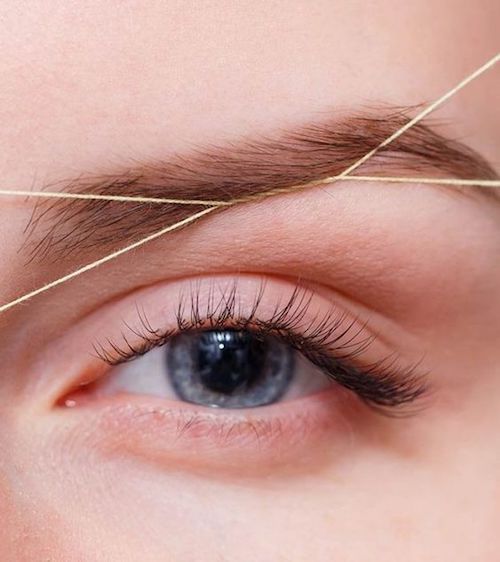
CreditStylecraze/Pinterest
Threading
Most commonly used for the upper lip or eyebrows, threading involves a technician using a piece of thread and twisting it throughout the area to remove the unwanted hairs at the root. Threading is often described as feeling like a prolonged pinching sensation. The process takes a lot longer than waxing, so is often considered the more painful hair method of the two. However, there are a few pros to threading your brows compared to waxing. Threading allows for more detailed work to give you the most precise brow shape. If you have sensitive skin, threading is the best alternative to waxing. Threading is gentle on the skin and is a great option for individuals who have recently gotten a chemical peel or those who are on medications that make them ineligible for waxing. Results from eyebrow threading (or other facial hair threading on the upper lip or chin) typically last for around 2-6 weeks before they're in need of a touch-up.
Epilating
Epilatorsunwanted hairs
Always exfoliate the skin before using an epilator to prevent in-grown hairs. Moisturize the skin immediately after epilating to reduce irritation. Choose a soothing lotion likeZensa Healing Creamor pure aloe vera gel to calm your complexion.
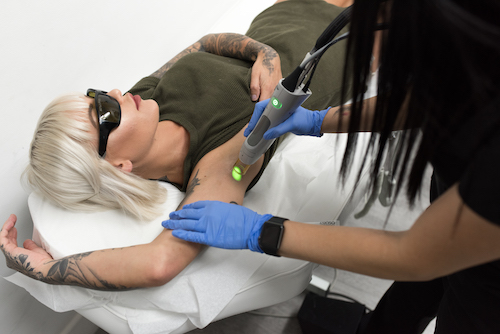
Laser Hair Removal
Laser hair removallaser hair removal
For many individuals, it is possible to have little to no unwanted hair growth for 2-5 years after a round of 5-10 laser treatments. These laser hair removal appointments should be scheduled 4-6 weeks apart. Laser hair removal could potentially be a permanent solution for a select few clients. However, it is most likely that around 85-95% of the hair growth will be delayed for months or years after completing a full round of laser treatments. After laser hair removal, the hair that does grow back will have a considerably finer and thinner hair texture than it did before you started laser treatments, making the sporadic touch-up appointments you will need over the years a breeze.
Without numbing cream, laser hair removal is considered to be more painful than waxing and rates high on the pain scale among common hair removal methods (generally hurts a little less than electrolysis). Most clients describe the sensation to be similar to the snapping of a rubber band on your skin (ouch). Anecdotes on whether laser hair removal hurts more or less with each follow-up session are mixed. Either way, using a lidocaine-based numbing cream is an effective way to significantly decrease the pain.
Zensa Numbing Cream contains 5% lidocaine for maximum-strength pain prevention and anti-inflammatory vitamin E to help support any post-laser hair removal swelling before the procedure even begins. Our unique formula has a natural pH, making it suitable for sensitive areas and is safe to reapply after 2-3 hours on broken skin to prolong the numbing sensation.

Electrolysis
Electrolysis is a permanent hair removal method that uses a thin wire inserted under the skin that uses an electrical current to destroy individual hair follicles and permanently inhibit future hair growth. It can take anywhere from 10-30 sessions to see the full benefits of electrolysis. Treatments should be scheduled every 2-4 weeks for optimal efficacy. Electrolysis is the most likely among different types of common hair removal methods to offer permanent results. This permanent hair removal method works well for all skin types, (fair to dark) complexions and hair textures.
However, this level of permanency does include a considerable amount of pain. Electrolysis is widely considered to be the most painful hair removal method. Many clients say electrolysis feels similar to getting a tattoo. Compared to a tattoo, the pain from electrolysis is often more intense and short-lived – until the slower-paced, sharper discomfort that comes along with getting inked. Fortunately, it is common practice to use a topical anaesthetic, like Zensa Numbing Cream, to help manage the pain level during the procedure.
How To Apply Zensa Numbing Cream For Hair Removal:
-
Clean & Apply: Clean the skin with a soapy cloth for 30 seconds. Apply a ½-inch thick layer of Zensa Numbing Cream onto the area. Do not rub it into the skin.
-
Seal: Cover the area with cling wrap (such as Press n’ Seal) for maximum absorption. Leave the cream in place for 15 minutes (Brazilian, underarms and upper lip) or 20-30 minutes (arms, legs, back, stomach).
-
Remove: Take off the cling wrap. Gently dab away (do not wipe) excess cream using sterile gauze. Begin the treatment. Reapply safely on broken skin as needed.
Read on to learn more on how to use numbing cream for tattoos, waxing and other common cosmetic procedures.

Hair Removal
Posted January 24, 2023
By Riley Priegel






































